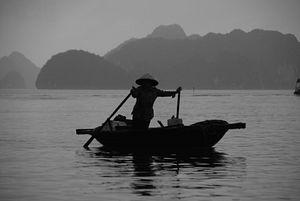In 2018, the Food and Agriculture Organization (FAO) marked June 5 as International Day to Fight Illegal, Unreported and Unregulated (IUU) fishing. According to the FAO, 26 million tonnes of fish globally fall prey to the illegal fishing each year. The value of this illegal capture can be placed between $10 billion and $23 billion. IUU fishing has been a serious concern for the entire Southeast Asian region. Overfishing, a recent commentary indicated, has put 64 percent of Southeast Asia’s total fisheries at risks ranging from medium to high levels; and it has caused substantial damages to the entire marine ecology in several ways. According to the ASEAN Guidelines for Preventing the Entry of Fish and Fishery Products from IUU Fishing into the Supply Chain, as revised in 2015, IUU fishing considerably adds to over-exploitation of fishing stocks; harm the marine ecosystem resulting in non-recovery of the lost fish stocks; and creates difficulties for legal fishermen by providing certain advantages to the illegal fishermen by increasing unfair competition in the market.
Southeast Asia has been facing the brunt of IUU fishing from the perspective of external trade as well. In 2008, the European Commission (EC) announced new regulations to fight IUU fishing and decided to give “Yellow Cards” to countries that do not follow the regulations. A Yellow Card essentially means that the receiving country gets a warning from the EC regarding IUU fishing and both parties can start a formal dialogue process to improve the situation in the affected country. It normally affects trade in seafood between the European countries and the country that has received the Yellow Card. In October 2017, the EC imposed avYellow Card on Vietnam, resulting in a decline in the export of seafood to European markets from Vietnam. As the Vietnamese local marine sector is looking to achieve a target of $10 billion in export revenue in 2019; removal of the Yellow Card status is critical.
In June 2018, an Inspection Delegation from the European Commission visited Vietnam’s Ministry of Agriculture and Rural Development and provided nine recommendations to prevent IUU fishing. In sync with those recommendations, Vietnam has now been working towards preventing IUU through several mechanisms. Recently, the Directorate of Fisheries that works under the Ministry of Agriculture and Rural Development (MARD) has stated that by July 1, 2019, all fishing vehicles (of 24 meters or more in length) in Vietnam’s Quang Tri province will have satellite technology, MOVIMAR, installed in them, in order to manage, trace and handle the location of fishing vehicles. The tracking technology would have to be switched on for 24 hours a day while at sea. The Quang Tri Provincial Fisheries Department is also working on installation of MOVIMAR in all fishing vehicles that have a length of 15 meters or more by 2020.
In the same direction of working to lift the Yellow Card status, Ba Ria-Vung Tau province in Vietnam has established a Working Group to facilitate the implementation of the 2017 Fisheries Law and established six representative offices in fishing ports enabling the authorities to better manage fishing vessels. They have also conducted regular training and dissemination workshops with the fishermen to provide them with knowledge about IUU fishing related issues and laws.
Vietnam has also tightened the surveillance mechanism to curtail illegal fishing in foreign waters. The 2017 Fisheries Law has a provision for imposing fines on fishing vehicles for illegally fishing in the foreign waters. In fact, according to some reports, the number of fishing vessels penetrating foreign waters has been on the decline since 2017, thanks to the collaborative efforts from the Vietnamese Navy, Coast Guards and Border Defence Forces.
Apart from Vietnam, Thailand and Philippines have also been given Yellow Cards from EC in the recent past. However, the identification of Thailand and Philippines as countries indulging into IUU fishing was revoked in January 2019 and in April 2015, respectively. In the region, Taiwan faces the same difficulty and Cambodia was blacklisted in 2014.
The severity of IUU fishing in Southeast Asia has occasionally twisted bilateral relations. For example, in the first week of May 2019, Raja Nushirwan Zainal Abidin, the deputy secretary general of the Malaysian Foreign Ministry, gave a protest memo to the Vietnamese ambassador in Kuala Lumpur to note the illegal intrusion of Vietnamese fishermen into Malaysian waters. Local news sources indicate that Malaysia has detained 748 Vietnamese fishing vehicles and 7,023 fishing groups since 2006. Preventing IUU fishing, therefore, calls for stable and comprehensive national plans alongside a regional approach.
Dr. Sampa Kundu is an assistant professor at the Symbiosis School of International Studies, Symbiosis International (Deemed University), Pune.
































